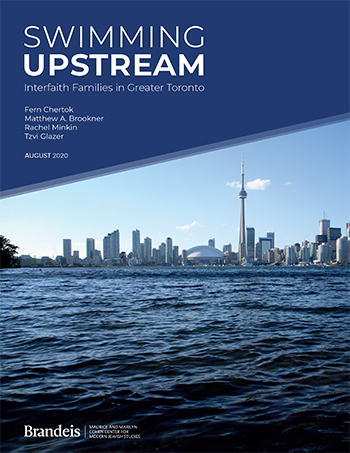Swimming Upstream: Interfaith Families in Greater Toronto
Fern Chertok, Matthew A. Brookner, Rachel Minkin, and Tzvi Glazer
 August 2020
August 2020
Conducted for UJA Federation of Greater Toronto, this multi-method study describes the experiences, perspectives and needs of the community’s growing population of young couples that include a Jewish partner and a partner from a different religious background. The study focuses on interfaith households with different levels of engagement with organizational Jewish life.
Forty couples were interviewed, and 436 were surveyed. Eligible couples either did not have children or had children ages five or younger. Couples were married, engaged-to-be-married, or cohabitating.
Key Findings
Expand All
Most couples felt it was important that their family have a place within the Jewish community and wanted more involvement in Jewish life. Whether or not they are raising children exclusively within Judaism or within both parents’ religions, almost all parents wanted their children to have a strong and unequivocal cultural Jewish identity.
Couples wanted offerings that acknowledged the needs of both Jewish and non-Jewish partners and invited open dialogue with other interfaith couples. Furthermore, couples felt most welcomed in Jewish spaces when events had a cultural focus, when hosts acknowledged the presence of non-Jewish participants, and when rituals and traditions were explained.
Limited Jewish knowledge prevented interfaith families from participating in Jewish life, educating their children, and becoming members of synagogues. At the same time, couples were looking for ways to learn about Judaism that were a mix of both “how-to” instructions as well as more in-depth exploration of Jewish values and thought.
The presence of local Jewish family provided couples with knowledge about local community offerings and opportunities to celebrate Jewish holidays. Couples without local Jewish family wished they had a social network with whom to share Jewish home celebrations.
Many felt frustrated that they could not find a Jewish clergy member to officiate their wedding and worried that their children would not be accepted as Jews without formal conversion. Couples felt unwelcomed in Jewish spaces when they overheard interfaith relationships denigrated or felt pressure to convert.
Couples were concerned about the cost and location of programs. The high cost of living in Toronto has pushed many younger couples outside of traditionally Jewish neighborhoods and couples, especially those with children, who live outside the Bathurst Corridor, noted difficulties finding conveniently located Jewish programs.
 August 2020
August 2020